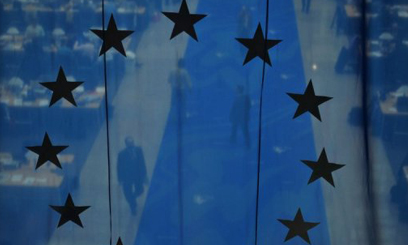BRUSSELS, Dec 9 – Britain stood out in the cold Friday after Prime Minister David Cameron, facing a revolt among his own lawmakers back home, blocked EU treaty changes at a summit here designed to save the eurozone.
Only Hungary sided with London in refusing to sign up to an alternative pact aiming to enshrine economic convergence and radical changes in governance that Cameron feared would translate into a transfer of power to Brussels.
Wartime allies in Libya, it marked a second clash in six weeks for Cameron on EU ground with French President Nicolas Sarkozy, after the latter told Britain’s premier to stop lecturing continental Europe on debts.
In England, the mass-selling Sun newspaper rolled out World War II comparisons, with mocked-up pictures of Cameron alternatively as “lame duck” prime minister Neville Chamberlain and “bulldog spirit” Winston Churchill.
The tabloid caricatures followed comments in parliament from Cameron’s own backbenchers to that effect.
The broadsheet Independent, meanwhile, said Cameron was “isolated,” and also used cartoon imagery of him in wartime fatigues, waving the white flag as a zeppelin in the image of Merkel approaches.
Cameron, who is in coalition with more pro-EU Liberal Democrats, is under pressure from some of his own Conservative MPs who are pushing for a referendum on any such transfer of power.
In October, Cameron suffered the largest rebellion of his premiership when 79 Tory lawmakers voted in favour of a referendum on Britain’s relationship with Europe.
The prime minister said he took a “tough but good” decision to block changes to the EU treaty presented by France and Germany as the way to resolve the eurozone debt crisis.
He said the absence of “safeguards” left him with no choice.
“I said before coming to Brussels that if I couldn’t get adequate safeguards for Britain in a new EU treaty then I wouldn’t agree to it. What is on offer isn’t in Britain interests, so I didn’t agree to it,” said the prime minister.
French President Nicolas Sarkozy said he would have preferred a deal across the 27 EU states.
However, “that wasn’t possible taking into account the position of our British friends,” he added.
Sarkozy said that Cameron asked for “something we all judged unacceptable — for a protocol to be inserted into the treaty granting the United Kingdom a certain number of exonerations on financial services regulations.
“We could not accept this, since we consider, quite on the contrary, that a part of the world’s woes stem from the deregulation of the financial sector,” Sarkozy added.
“If we had accepted a derogation for the United Kingdom, that would mean to throw into question a large part of the very necessary work done to regulate financial services,” he said.
Cameron said the euro was the divisive factor. “Britain is out of it and will remain out of it,” he said.
Unable to convince his peers that Britain should be given veto power over any changes to financial regulation that could affect the powerful City of London, the result, said EU president Herman Van Rompuy, was that the eurozone 17, plus six others, had decided to go ahead without the others.
Along with Britain, Hungary decided against joining the group. Sweden and the Czech Republic said they had to consult their parliaments before making a decision.
Cameron’s Foreign Secretary William Hague rejected the idea that a “two-speed” Europe was on the way.
“One could debate who would move at a faster speed, and certainly no one should make the assumption that the eurozone moves at a faster speed than the United Kingdom.”
Sweden’s Foreign Minister Carl Bildt joked on Twitter: “Worried that Britain is starting to drift away from Europe in a serious way. To where? In a strong alliance with Hungary.”



































